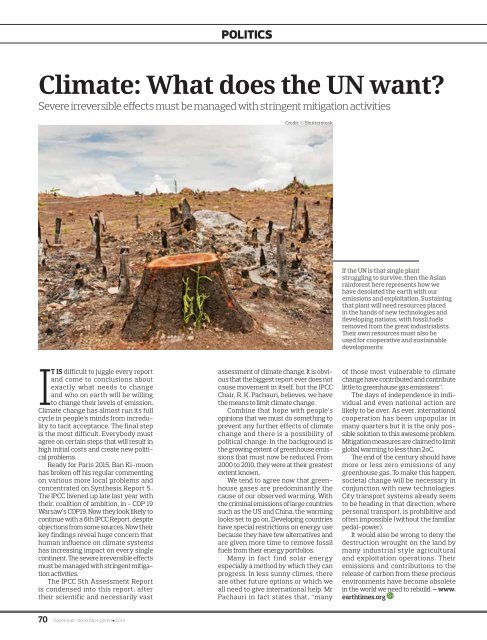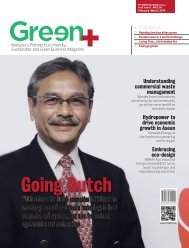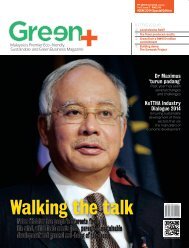Green+ Malaysia's Premier Eco-friendly, Sustainable and Green Business Magazine
SIRIM - Technology Provider
SIRIM - Technology Provider
Create successful ePaper yourself
Turn your PDF publications into a flip-book with our unique Google optimized e-Paper software.
POLITICS<br />
Climate: What does the UN want?<br />
Severe irreversible effects must be managed with stringent mitigation activities<br />
Credit: © Shutterstock<br />
If the UN is that single plant<br />
struggling to survive, then the Asian<br />
rainforest here represents how we<br />
have desolated the earth with our<br />
emissions <strong>and</strong> exploitation. Sustaining<br />
that plant will need resources placed<br />
in the h<strong>and</strong>s of new technologies <strong>and</strong><br />
developing nations, with fossil fuels<br />
removed from the great industrialists.<br />
Their own resources must also be<br />
used for cooperative <strong>and</strong> sustainable<br />
developments<br />
It is difficult to juggle every report<br />
<strong>and</strong> come to conclusions about<br />
exactly what needs to change<br />
<strong>and</strong> who on earth will be willing<br />
to change their levels of emission.<br />
Climate change has almost run its full<br />
cycle in people’s minds from incredulity<br />
to tacit acceptance. The final step<br />
is the most difficult. Everybody must<br />
agree on certain steps that will result in<br />
high initial costs <strong>and</strong> create new political<br />
problems.<br />
Ready for Paris 2015, Ban Ki-moon<br />
has broken off his regular commenting<br />
on various more local problems <strong>and</strong><br />
concentrated on Synthesis Report 5..<br />
The IPCC livened up late last year with<br />
their, coalition of ambition, in - COP 19<br />
Warsaw’s COP19. Now they look likely to<br />
continue with a 6th IPCC Report, despite<br />
objections from some sources. Now their<br />
key findings reveal huge concern that<br />
human influence on climate systems<br />
has increasing impact on every single<br />
continent. The severe irreversible effects<br />
must be managed with stringent mitigation<br />
activities.<br />
The IPCC 5th Assessment Report<br />
is condensed into this report, after<br />
their scientific <strong>and</strong> necessarily vast<br />
assessment of climate change. It is obvious<br />
that the biggest report ever does not<br />
cause movement in itself, but the IPCC<br />
Chair, R. K. Pachauri, believes, we have<br />
the means to limit climate change.<br />
Combine that hope with people’s<br />
opinions that we must do something to<br />
prevent any further effects of climate<br />
change <strong>and</strong> there is a possibility of<br />
political change. In the background is<br />
the growing extent of greenhouse emissions<br />
that must now be reduced. From<br />
2000 to 2010, they were at their greatest<br />
extent known.<br />
We tend to agree now that greenhouse<br />
gases are predominantly the<br />
cause of our observed warming. With<br />
the criminal emissions of large countries<br />
such as the US <strong>and</strong> China, the warming<br />
looks set to go on. Developing countries<br />
have special restrictions on energy use<br />
because they have few alternatives <strong>and</strong><br />
are given more time to remove fossil<br />
fuels from their energy portfolios.<br />
Many in fact find solar energy<br />
especially a method by which they can<br />
progress. In less sunny climes, there<br />
are other future options or which we<br />
all need to give international help. Mr<br />
Pachauri in fact states that, “many<br />
of those most vulnerable to climate<br />
change have contributed <strong>and</strong> contribute<br />
little to greenhouse gas emissions”.<br />
The days of independence in individual<br />
<strong>and</strong> even national action are<br />
likely to be over. As ever, international<br />
cooperation has been unpopular in<br />
many quarters but it is the only possible<br />
solution to this awesome problem.<br />
Mitigation measures are claimed to limit<br />
global warming to less than 2oC.<br />
The end of the century should have<br />
more or less zero emissions of any<br />
greenhouse gas. To make this happen,<br />
societal change will be necessary in<br />
conjunction with new technologies.<br />
City transport systems already seem<br />
to be heading in that direction, where<br />
personal transport, is prohibitive <strong>and</strong><br />
often impossible (without the familiar<br />
pedal-power).<br />
It would also be wrong to deny the<br />
destruction wrought on the l<strong>and</strong> by<br />
many industrial style agricultural<br />
<strong>and</strong> exploitation operations. Their<br />
emissions <strong>and</strong> contributions to the<br />
release of carbon from these precious<br />
environments have become obsolete<br />
in the world we need to rebuild. – www.<br />
earthtimes.org<br />
70<br />
november-december, green+.2014





